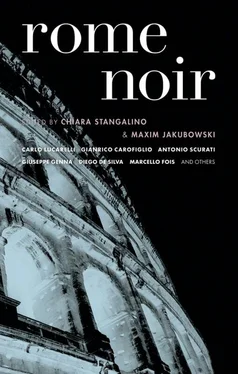Джанрико Карофильо - Rome Noir
Здесь есть возможность читать онлайн «Джанрико Карофильо - Rome Noir» весь текст электронной книги совершенно бесплатно (целиком полную версию без сокращений). В некоторых случаях можно слушать аудио, скачать через торрент в формате fb2 и присутствует краткое содержание. Город: New York, Год выпуска: 2009, ISBN: 2009, Издательство: Akashic Books, Жанр: Детектив, на английском языке. Описание произведения, (предисловие) а так же отзывы посетителей доступны на портале библиотеки ЛибКат.
- Название:Rome Noir
- Автор:
- Издательство:Akashic Books
- Жанр:
- Год:2009
- Город:New York
- ISBN:978-1-933354-64-4
- Рейтинг книги:3 / 5. Голосов: 1
-
Избранное:Добавить в избранное
- Отзывы:
-
Ваша оценка:
- 60
- 1
- 2
- 3
- 4
- 5
Rome Noir: краткое содержание, описание и аннотация
Предлагаем к чтению аннотацию, описание, краткое содержание или предисловие (зависит от того, что написал сам автор книги «Rome Noir»). Если вы не нашли необходимую информацию о книге — напишите в комментариях, мы постараемся отыскать её.
Rome Noir — читать онлайн бесплатно полную книгу (весь текст) целиком
Ниже представлен текст книги, разбитый по страницам. Система сохранения места последней прочитанной страницы, позволяет с удобством читать онлайн бесплатно книгу «Rome Noir», без необходимости каждый раз заново искать на чём Вы остановились. Поставьте закладку, и сможете в любой момент перейти на страницу, на которой закончили чтение.
Интервал:
Закладка:
The shutters let in thin streams of light that would be transformed into clouds of multicolored dust when they touched the peacock feathers that, grouped in bunches of ten, greeted the visitor, peeking out from the mouths of amphoras as tall as a standing greyhound. Not that real dogs were lacking: Ten examples of an eccentric dog lover’s passion in white porcelain, five on one side of the room, five on the other, exchanged aquamarine glances, thanks to large turquoise gems embedded at nose level. First Communions at the church of San Giovanni in Laterano and other sacraments were guaranteed remembrance in massive silver frames, just as an unintentional colonial tribute was given life on the ceiling (white tiger skin) and on one of the carpets (stuffed crocodile). It was as if two irreconcilable images had found a point of contact: The humor of a Barberini tormented by vice and bombast matched the happiness, the innocent exultation of joy, the expressive apex of one who, stuck until the day before among anonymous ragpickers, could say to himself, Now I am a rich man .
The police looked around and split up. One to check the garden, one in the kitchen, four upstairs, the others to the basement.
I spent a lot of time in that villa over the years. And its layout is still vivid to my eyes: I can remember perfectly the tables, the brocades, the big jukebox with Claudio Villa always in pole position. I can visualize every inch of those rooms and, wonder after wonder, despite all the time that has passed, I can, in lucky moments, touch the jugular, recalling, with great precision, the cardiac tumult of a pusher on the run. But I cannot enter into the minds of the enforcers of order. So, really, I couldn’t answer the following questions:
What did policeman number 1 think when he turned his back on the veranda — two large palms arching over his head, gaze driven beyond the slides, the bushes, the swing, and onward, as far as the gladiolus that beautified a stone wall crowned by the opaque sparkle of shards of glass?
How did policeman number 2 kill time, left alone in the kitchen among unknown appliances (many imported from America) for the entire duration of the search?
What was the reaction of numbers 3, 4, 5, and 6, who, moving up to the second floor, found themselves facing a ten-million-lire Steinway whose only purpose was to be stroked by a dust cloth? Above all, what did numbers 5 and 6 feel — not those who searched the bedroom of the Candito spouses but the other two, the ones who entered a room with peach-colored wallpaper, a space saturated with the fruit-flavored oiliness of lip gloss and populated by life-size stuffed animals, necklaces, posters of Jennifer Beals in Flashdance in track suit and leg warmers? What did numbers 5 and 6 feel: the reproof that certain adults reserve for spoiled girls or, on the contrary, the hot, suffocating sensation of vice imprisoned in a cotton camisole, the violent ambiguity of bitter fruits and little girls that lead men to ask forgiveness for crimes that we might all be driven to commit? Silvia Candito, sixteen years old in 1987, now married with two children: one of the few to be saved.
What was to be found was found by policemen numbers 7, 8, 9, and 10. They signaled quickly to one another and took the stairs that led to the basement. It was one big space, without dividing walls, set up as a game room: billiard table, jukebox, strobe light, a long stone bench that stretched around the entire perimeter of the room. Two boys were squatting under the billiard table. Their calves had been straining for who knows how long, their bottoms a few inches from the floor. Both with arms around their knees.
“Saverio Candito,” said one of the policemen.
The boy hugged his knees tighter behind the reddish down of his forearms and gave his notorious look of surrender. If he had stood up it would have been immediately obvious that he was extremely short for a seventeen-year-old. He had a stocky body, muscular arms and shoulders, a small belt of blubber around his hips, that copper-colored hair, curly, very short. When he was in trouble he fixed his adversaries with a harsh look of capitulation, the sort of look that a boxer might be facing who has dominated the entire match and who now, in the last round, wants to satisfy his desire for a knockout: a look that didn’t say, simply, I’m yours . It said: I’m in deep shit, and if you want me you’ll have to come in and get me .
But the cop couldn’t be intimidated by this boy’s code, whose nuances he barely grasped. He reformulated the question.
“Saverio Candito. That’s you, right?”
“No,” said Saverio.
They were used to more complex situations. This type of emergency was kids’ stuff, you could handle it by following the rules in the manual, step by step. Lately, they had been dealing with men who cursed saints and madonnas while with one hand they grabbed another man by the hair and with the free hand shoved a gun in the guy’s mouth. Thus, a second policeman decided that he could make a little scene. He raised a hand toward his colleagues, as if to say, Leave it to me, now let’s have some fun. So he took a salmon-colored, plastic-covered rectangle and threw it in the boy’s face without saying a word.
Saverio caught it. There he found his name and surname and date of birth and all the rest, and a photo from two years earlier in which he was smiling with half-closed eyes. He wondered how the police could possibly have his ID. For an instant he entertained the completely absurd hypothesis of a forgery. Then he realized that he had simply lost it in the wrong place. He emerged from under the billiard table, giving himself up to the cops.
At that point the second boy also came out. He was wearing jeans, sneakers, a T-shirt with blue writing in swirling rodeo-type letters: Country by the Grace of God .
“Don’t tell my parents,” Danilo said with a sad smile.
“The third one’s missing” was policeman number 7 or 8’s sole response.
The two boys, who were now standing with their heads down, and practically on the point of holding each other by the hand, said nothing.
“There were three of you,” the man explained. “We know, they saw you. Come on, where’s the other boy?”
Maybe at this point the two kids felt challenged. Something was rekindled in their eyes. They were coming from two years of confrontations that were like jumping into rings of fire, and that invitation to betrayal was like an injection of hope. They continued to say nothing, but suddenly, in their looks, things seemed okay in this world.
“Listen,” said the man, and from his tone it sounded like the standard speech in which one says how you should and shouldn’t behave to avoid compromising an already very delicate situation. But one of his colleagues didn’t let him get started.
“Shh... quiet... wait.”
On the opposite side of the basement, to the left of the big window that looked onto the garden, there was a door lacquered in white, one of those coffer doors that never close perfectly. It was water. When, growing silent, they tried to focus their hearing in that direction, they realized that strange but indisputable aquatic noises were coming from beyond the door, a choof-choof of bodies forcefully moving in a pool, a regular sound that had, however, nothing mechanical about it — it wasn’t a mill or a washing machine, it was someone playing with water, a dimension like rocks thrown in a pond, like water polo, shipwreck and premeditation at the same time.
“That’s me,” said the man, placing the glass with the Bellini on the parapet of the balcony. An umbrella with a rice-paper shade was sticking up out of the mixture of champagne and peach juice. He covered the convex surface of the receiver with the palm of his right hand and threw his left back: “And goddamn it, be quiet!”
Читать дальшеИнтервал:
Закладка:
Похожие книги на «Rome Noir»
Представляем Вашему вниманию похожие книги на «Rome Noir» списком для выбора. Мы отобрали схожую по названию и смыслу литературу в надежде предоставить читателям больше вариантов отыскать новые, интересные, ещё непрочитанные произведения.
Обсуждение, отзывы о книге «Rome Noir» и просто собственные мнения читателей. Оставьте ваши комментарии, напишите, что Вы думаете о произведении, его смысле или главных героях. Укажите что конкретно понравилось, а что нет, и почему Вы так считаете.












